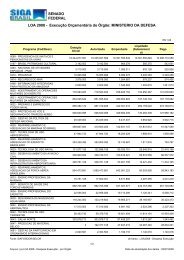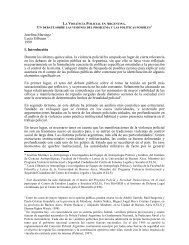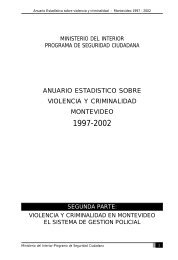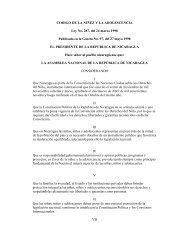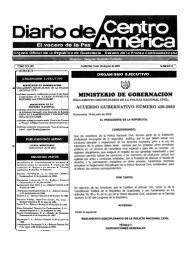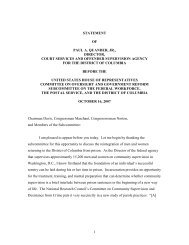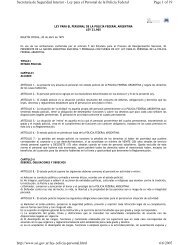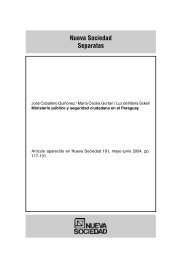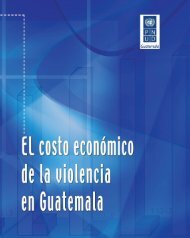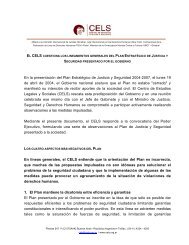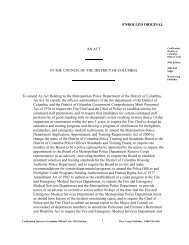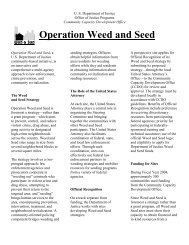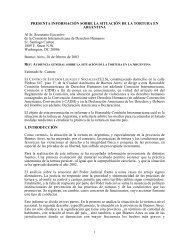Venezuela: The Life and Times of the Party System - Political ...
Venezuela: The Life and Times of the Party System - Political ...
Venezuela: The Life and Times of the Party System - Political ...
Create successful ePaper yourself
Turn your PDF publications into a flip-book with our unique Google optimized e-Paper software.
against <strong>the</strong> Medina government. A coup was launched on October 18, 1945, <strong>and</strong> after a brief<br />
struggle a provisional junta was formed with four members from AD, two <strong>of</strong>ficers, <strong>and</strong> one<br />
independent civilian. <strong>The</strong> ensuing three-year period or trienio marks <strong>the</strong> definitive introduction <strong>of</strong><br />
mass politics into national life.<br />
Trienio politics brought decisive <strong>and</strong> long-lasting changes. Barriers to participation were<br />
lowered, suffrage was made genuinely universal (all citizens over 18, with no restrictions by<br />
education, gender, or property). <strong>The</strong> electorate exp<strong>and</strong>ed from 5 percent <strong>of</strong> <strong>the</strong> population before<br />
1945 to 36 percent immediately <strong>the</strong>reafter. Free, direct elections were instituted at all levels, from<br />
municipal councils <strong>and</strong> state legislatures to <strong>the</strong> national congress (deputies <strong>and</strong> senators), <strong>and</strong><br />
president. New parties were also formed, most importantly COPEI (a Christian Democratic group<br />
formed in 1946) <strong>and</strong> URD, which grouped <strong>the</strong> non-Communist left wing <strong>of</strong> forces that had backed<br />
Medina. Organization <strong>of</strong> all kinds was effectively stimulated <strong>and</strong> grew rapidly, especially among<br />
labor <strong>and</strong> peasant groups. Services like education, health, water, <strong>and</strong> communications were<br />
extended for <strong>the</strong> first time to poor <strong>and</strong> peripheral groups <strong>and</strong> regions. AD’s leaders thus delivered<br />
on <strong>the</strong>ir promises, <strong>and</strong> as a result <strong>the</strong> party streng<strong>the</strong>ned its mass base in spectacular <strong>and</strong> long-<br />
lasting fashion.<br />
Although exp<strong>and</strong>ed participation <strong>and</strong> extended benefits streng<strong>the</strong>ned <strong>the</strong> party<br />
enormously, it also sparked a series <strong>of</strong> bitter conflicts. Opposition to specific policies was<br />
reinforced by elite fears that <strong>the</strong> new regime would completely erase <strong>the</strong> existing social order.<br />
<strong>The</strong>se beliefs were exacerbated by <strong>the</strong> very scale <strong>of</strong> AD’s domination. <strong>The</strong> party was in total<br />
control <strong>of</strong> most popular organizations <strong>and</strong> popular organizations in turn swept <strong>the</strong> field. Economic<br />
<strong>and</strong> social elites had always relied on control <strong>of</strong> <strong>the</strong> army <strong>and</strong> administration for guarantees <strong>of</strong><br />
power <strong>and</strong> privilege. Popular organizations must have seemed superfluous in a system that<br />
rewarded cliques <strong>and</strong> personal influence more than <strong>the</strong> capacity to move masses.<br />
For all <strong>the</strong>se reasons, although <strong>the</strong> trienio saw AD build <strong>and</strong> secure a mass base, it also<br />
saw AD systematically alienate a growing number <strong>of</strong> powerful groups. Opposition ga<strong>the</strong>red on<br />
<strong>the</strong> right, represented by <strong>the</strong> Catholic Church, by new political parties like COPEI, <strong>and</strong> by<br />
conservative elements in <strong>the</strong> military, in business (foreign <strong>and</strong> domestic) <strong>and</strong> in <strong>the</strong> US Embassy.<br />
Confident in its vast electoral majorities <strong>and</strong> secure in its alliance with <strong>the</strong> military, AD largely<br />
ignored such opposition, but did so at growing peril, falling on November 24, 1948 to a military<br />
coup. <strong>The</strong> three-year experiment in democracy gave way to a decade <strong>of</strong> bloody dictatorship.<br />
Under <strong>the</strong> leadership <strong>of</strong> Gen. Marcos Perez Jimenez, AD was banned. Educational, labor, <strong>and</strong><br />
agrarian reforms were all rescinded <strong>and</strong> a new deal was reached with <strong>the</strong> oil companies. <strong>Political</strong><br />
opposition was dealt with through a combination <strong>of</strong> bribery, fraud, <strong>and</strong> violence. A large secret<br />
police force (Seguridad Nacional) hunted down opponents, <strong>and</strong> ran notorious concentration



